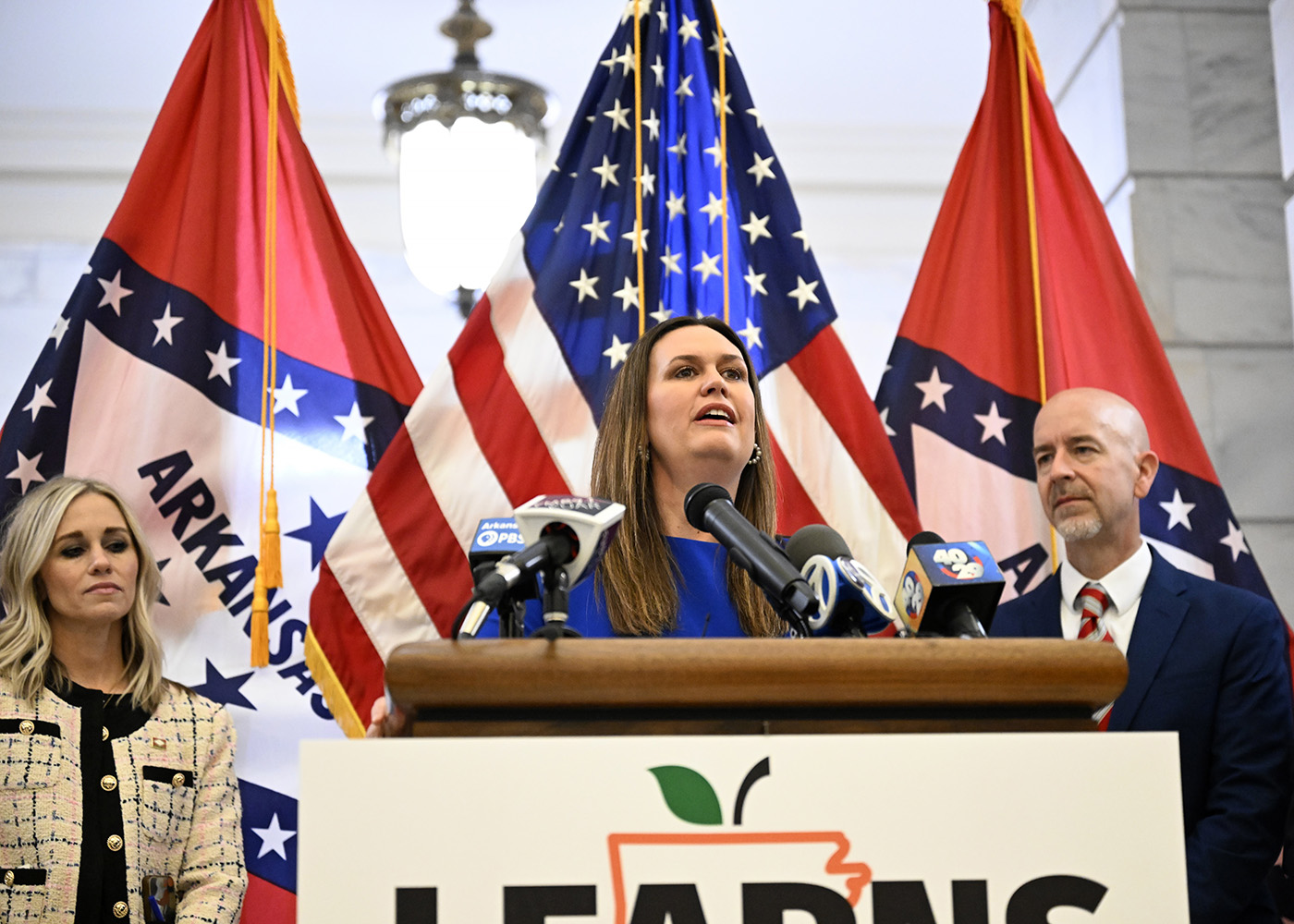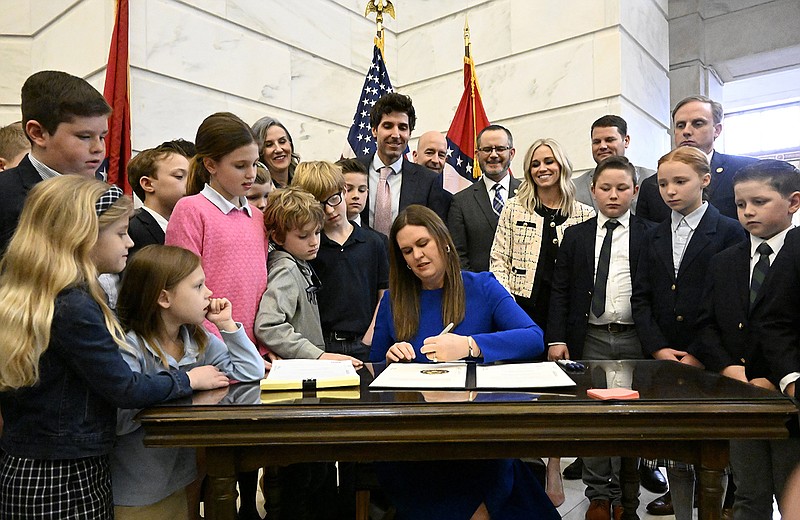Gov. Sarah Huckabee Sanders signed her education bill into law Wednesday afternoon, calling it "the largest overhaul of the state's education system in Arkansas history."
During a ceremony in front of a crowd of onlookers and legislators in the second-floor rotunda of the state Capitol, the governor described her education reform package -- a 145-page omnibus law that covers everything from school vouchers, to increased pay for teachers and higher literacy standards for elementary students -- as "a comprehensive approach to all education, from cradle to career."
"We've seen how the status quo condemns Arkansans to a lifetime of poverty, and we're tired of sitting at the bottom of national education rankings," Sanders said. "We know that if we don't plant this seed today, then there will be nothing for our kids to reap down the line."
The law, also known as the LEARNS Act, has been the top priority for Sanders since she took office in January. The bill includes school vouchers, a $14,000 raise in the starting salary for teachers, a dual diploma program for high school students learning a trade, and a repeal of the Teacher Fair Dismissal Act, which will make it easier for school districts to fire teachers because of poor performance.
The bill also includes raises for educators, with all teachers receiving "at least a $2,000 raise," Sanders said.
The voucher program, called Educational Freedom Accounts, will allow students to use state education dollars to attend a private or home school of their choice. The bill passed the House and Senate with an emergency clause, which means it can take effect immediately.
For three weeks, the bill made its way through the Legislature with complaints from some that the process to pass the bill was rushed.
While the Republican governor campaigned on a broad outline of education reform that called for parental empowerment, new literacy standards and accountability for teachers, Sanders did not disclose details of her long-awaited education plan until Feb. 8, exactly a month before she signed the LEARNS Act into law.
Sanders declined to take questions from reporters after the bill signing Wednesday.
Rep. Keith Brooks, R-Little Rock, who along with Sen. Breanne Davis, R-Russellville, served as the bill's sponsors, said the law means Arkansas will be a national leader in education and can "reimagine what learning is."
"Today Arkansas steps up and makes a covenant with generations to come that we will lead the way for education transformation in the United States of America," Brooks said.
For Arkansas Department of Education Secretary Jacob Oliva, the work has just begun, he said, as the department is tasked with promulgating rules to govern and enforce various provisions in the LEARNS Act.
"While we have taken the first big step on our journey, we have not arrived," Oliva said. "I look forward to continuing to work with educators, leaders, legislators, families and students as we begin the implementation process."
VOUCHER PROGRAM
The new voucher program the law creates called Educational Freedom Accounts ties state funding for public schools to students. Students who receive an Educational Freedom Account will get 90% of what public schools get per student in state funding from the previous school year. The per-student funding for the 2022-2023 school year was $7,413.
The Educational Freedom Accounts program will be phased in over three years beginning with the 2023-2024 school year, creating a tiered priority list for students. At the top of the list for vouchers will be students who are enrolled at F-rated schools; who are enrolled in kindergarten; who were or are in a foster care program; who have a disability; or who have an active-duty military parent.
The next priority will be given to students who are enrolled in a D-rated school; who have a parent who is a military veteran; or who are children of first-responders. By the 2025-2026 school year, each student who is eligible to enroll in a public school will be eligible for a voucher to attend a private or home school.
Sanders said the voucher program would end a "one-size-fits-all model," where students attend schools based on their zip code rather than their individual needs.
"Under Arkansas' current system, a family's zip code is often the only thing that determines whether their kids will get the education that they need to succeed," Sanders said. "With new Education Freedom Accounts, parents will be able to send their kids to whatever school works best, whether it's private, public, parochial or home school."
The voucher program has been the most debated provision of the LEARNS Act, gaining praise, and criticism, from state and national groups. Critics of the Educational Freedom Accounts said they will divert much-needed state funding meant for public schools to private schools.
"LEARNS creates a tiered system to give some students better advantages than others," Senate Minority Leader Greg Leding, D-Fayetteville, said in a statement. "Public schools educate over 90% of students in Arkansas, but now they will be forced to compete for public tax dollars against private schools that don't have to follow the same rules."
House Minority Leader Tippi McCullough, D-Little Rock, said in a statement that "LEARNS will dismantle and defund our public schools through a voucher system that has not worked anywhere ever. While some of the bill is admirable, its purported benefits will not reach our students in greatest need."
National conservative and pro-school choice groups released statements Wednesday lauding Sanders for the passage of the LEARNS Act, saying Arkansas will join the ranks of states such as Arizona and West Virginia that have implemented similar education measures.
"The new Arkansas Children's Educational Freedom Account Program makes Arkansas the 11th state in the union to adopt a form of educational savings accounts," said Jessica Anderson, executive director of Heritage Action, a conservative advocacy group, in a statement. "This initiative will ultimately allow every family in the state to qualify and ensure each of their children can attend the education institution of their choice."
Robert Enlow, president of EdChoice, an Indianapolis-based non-profit that advocates for school vouchers, said in a statement, "The heightened parental engagement instigated by the Covid-19 pandemic hasn't slowed down; parents continue to demand the ability to customize where and how their children are educated, and lawmakers are listening."
TEACHER PAY
The LEARNS Act will raise the starting teacher salary to $50,000 a year, leaving Arkansas behind only Washington, Hawaii, New Jersey and the District of Columbia in starting teacher pay, according to the National Education Association, the nation's largest teachers union.
Teachers making above the new $50,000 a year minimum also will receive a $2,000 raise and can earn a bonus of up to $10,000 for good performance or being willing to teach a subject matter or in a geographic area that is in high demand.
"We all know that an excellent education starts with excellent teachers," Sanders said. "Arkansas LEARNS gives our public schools the resources they need to attract and retain our great teachers."
To attract more to the profession, the law creates a "Teacher Academy Scholarship Program," which covers tuition costs for prospective and current educators. The state's student loan repayment plan also will be increased from up to $3,000 to $6,000 per year.
The law repeals the Teacher Fair Dismissal Act, a law that requires school districts to notify teachers of changes in their employment status before May 1 each year.
The move is meant to make it easier for school districts to fire teachers for poor performance, something Sanders hinted at when she campaigned on accountability for teachers. Teachers will still have the "opportunity for a hearing" and notice before they can be fired.
The bill also repeals the state's salary schedule for teachers, instead requiring each school district to come up with its own pay structure for educators.
"As a teacher for three decades, I am worried about what this will do to the teaching profession," McCullough said. "It does raise the minimum salary, but it revokes workplace protections and unnecessarily voids a uniform salary schedule that was mandated by the courts. That's a slap in the face to educators and will exacerbate our teacher shortage."
OTHER ASPECTS
The LEARNS Act also sets a new standard for literacy in Arkansas, barring students -- with exceptions -- who fail to meet the state Department of Education's reading requirements from advancing from the third grade. The bill calls for 120 literacy coaches and grants for families to hire tutors to assist students with reading.
High school students also will have the "option to earn a high school diploma through a career-ready pathway," where a student could take classes to prepare them for a career that does not require a college degree, such as automotive mechanics or agriculture.
The bill requires high schools to offer students a "career ready" pathway for the ninth-grade class by the 2024-2025 year to focus their education on "modern career and technical studies aligned with high-wage, high-growth jobs in Arkansas," as part of a focus on technical education.
The law also includes codification of Sanders' executive order on Critical Race Theory, which requires the Department of Education to review policies and materials that "promote teaching that would indoctrinate students with ideologies, such as Critical Race Theory."
Also included in the act are recommendations from the Arkansas School Safety Commission, which reconvened this summer, mandating that public schools develop a comprehensive school safety assessment and work with local police to improve safety.
THE COST
The LEARNS Act will cost the state $297.5 million in the first year, with $150 million of that coming in the form of new spending, according to a study by the Arkansas Department of Education.
In year two, the cost will increase to $343.3 million, including $250 million in new funding. Pay for teachers will cost the state $180 million. The law's voucher program will cost $46.7 million in the first year and $97.5 in the second year, according to the Department of Education.
In the third year, the program will cost the state an estimated $175 million, said Robert Brech, deputy director of budget at the Department of Finance and Administration.
The Education Department's analysis estimates 7,000 students will enroll in the Educational Freedom Accounts program in the first year, and 14,000 in the following year.
Read the full text of the bill here » SB 294, also known as the Arkansas LEARNS Act
 State Sen. Breanne Davis, Gov. Sarah Huckabee Sanders and state Education Secretary Jacob Oliva talk about the education overhaul bill during a signing ceremony Wednesday at the state Capitol. Oliva said the work has just begun. “While we have taken the first big step on our journey we have not arrived,” he said. (Arkansas Democrat-Gazette/Stephen Swofford)
State Sen. Breanne Davis, Gov. Sarah Huckabee Sanders and state Education Secretary Jacob Oliva talk about the education overhaul bill during a signing ceremony Wednesday at the state Capitol. Oliva said the work has just begun. “While we have taken the first big step on our journey we have not arrived,” he said. (Arkansas Democrat-Gazette/Stephen Swofford)
